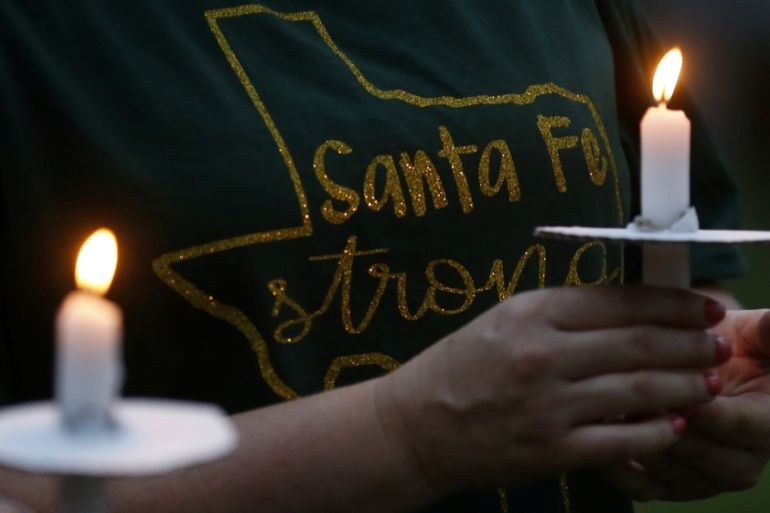How we grew arrogant enough to believe we have the right to kill
After Santa Fe, we must be honest with ourselves about the role violence plays in our politics.

In the aftermath of the Santa Fe High School shooting, Texas’ lieutenant governor Dan Patrick blamed such attacks on gun owners who don’t lock up their guns, and on the “design of schools” which have too many “entrances and exits”.
While licensed gun holders should certainly take care to safely lock up their guns, that does not address the larger issue of gun ownership, nor does it address our US culture that, whether we admit it or not, has become desensitised to these mass shootings. Furthermore, blaming building design for this shooting is just one more way US officials are evading their very real responsibility to do more to stop such attacks.
Keep reading
list of 4 itemsIsraeli settlers set fire to cars, homes of Palestinians under occupation
Gunmen kill at least 11 in two attacks in Pakistan’s Balochistan
A knotty question of parent liability in the Crumbley school shooting case
Of course, as usual, that wasn’t the only ridiculous excuse given for the latest attack. Former NYPD and FDNY Commissioner, Howard Safir, called into Fox News as a guest to blame the Common Core curriculum, which he claimed “takes emotionally disturbed kids and learning disabled kids and mainstreams them into the general population of students”. Aside from the inhumanity and inaccuracy of such a declaration, in 2013, Texas outlawed implementing Common Core standards in public school assessments.
As someone who does not identify as a Republican or Democrat, or as a liberal or a conservative, it gets old watching the policy debate after a school shooting divide itself into two camps: those defending the “Second Amendment right to bear arms”, and those calling for stricter gun control laws that would make it more difficult for citizens to own assault rifles. As I see it, the bigger problem lies with the former group, which tries to blame everything but guns for these attacks, and paints the latter group as “bleeding heart liberals”, even smearing the very children who have lived through these attacks.
After every shooting, it is difficult to try to reconcile between policy formulation and review, and between the pain of not only the students, but also their families, teachers and community members who will now forever associate their high school with senseless violence. It is almost impossible to muster the words needed to process why this keeps happening without causing further pain to the community suffering such loss. But if there’s one thing I know, it is that “thoughts and prayers”, closing off entrances, arming teachers, or blaming this violence solely on mental illness, will not suffice in our collective search for a solution.
What happened to humanity?
It sounds naive, but the reality is that any policy debate about mass shootings shouldn’t centre only on the desire to own weapons, or only on our gun control laws.
If we focus only on the type of weapons being used, we will miss the question of the sanctity of human life that should not be, but is always absent from these debates.
|
|
In fact, the shooter in this latest attack did not just use guns in his attack: he also planted bombs. Thus, in this cycle of violence, the larger policy question cannot be just debating controlling the methods by which Americans are killing one another, but going a step further to analyse what exactly prompts young Americans to believe that they are entitled to take a fellow human’s life.
Yes, we cannot anticipate who is capable of killing fellow human beings. We cannot comprehend the evil it takes to kill. However, I remember being in high school, watching the coverage of the Columbine shootings and being scared to my core that people my age not only had access to these weapons, but also the arrogance to believe they had a right to take other people’s lives.
As Americans, we must be honest with ourselves when debating mass shootings and violence. We must be cognisant of the violence ingrained in our policies, both foreign and domestic.
Whether we approach the Second Amendment with an individual or collective lens, the centuries-old amendment itself is evidence that the ability to perpetrate violence against one another is not a new policy debate.
Terrorism definitions are not a solution
After this latest school shooting, I again saw people rushing to point out the double standards in coverage and in law enforcement reactions. Some argued that had the shooter been a person of colour, he wouldn’t have been captured alive. Others argued that the shooting would have been labelled “an act of terrorism” had the shooter been non-white or named Ahmad.
While these double standards are honest assessments of our media’s inconsistencies in coverage, the reality is that even if we categorise these attacks as “terrorism”, our “anti-terror” policies are an epic failure as well.
They have resulted in our nation killing hundreds of thousands, if not millions, of people overseas, with no end to “terrorism” (domestic or foreign) in sight.
In other words, whether we label mass shootings as “terrorism” or not, the outcome is the same: we have no effective policies in place that will stop this type of violence.
And honestly, whether as a human being or as a policy analyst, I recognise that our social fabric needs to face our violent past and present with brutal honesty before we can even attempt to formulate effective policies engrained in the sanctity of human life rather than in our own interests and desires.
The views expressed in this article are the author’s own and do not necessarily reflect Al Jazeera’s editorial policy.
